常见12个典型的英文错误
- 格式:docx
- 大小:18.60 KB
- 文档页数:2
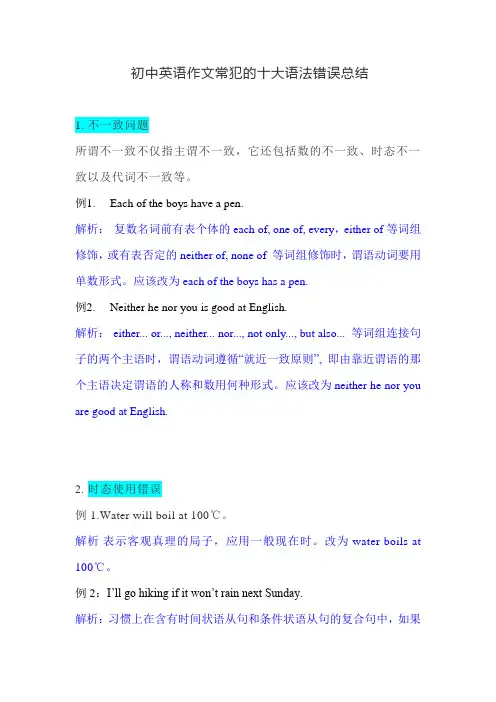
初中英语作文常犯的十大语法错误总结1. 不一致问题所谓不一致不仅指主谓不一致,它还包括数的不一致、时态不一致以及代词不一致等。
例1.Each of the boys have a pen.解析:复数名词前有表个体的each of, one of, every,either of等词组修饰,或有表否定的neither of, none of 等词组修饰时,谓语动词要用单数形式。
应该改为each of the boys has a pen.例2.Neither he nor you is good at English.解析:either... or..., neither... nor..., not only..., but also... 等词组连接句子的两个主语时,谓语动词遵循“就近一致原则”, 即由靠近谓语的那个主语决定谓语的人称和数用何种形式。
应该改为neither he nor you are good at English.2.时态使用错误例1.Water will boil at 100℃。
解析表示客观真理的局子,应用一般现在时。
改为water boils at 100℃。
例2:I’ll go hiking if it won’t rain next Sunday.解析:习惯上在含有时间状语从句和条件状语从句的复合句中,如果主句的谓语动词用了一般将来时,从句的谓语动词要用一般现在时表示将来的动作。
应该改为:I’ll go hiking if it doesn’t rain next Sunday.例3:Teacher told us yesterday that the earth went around the sun.解析:习惯上在含有宾语从句的复合句中,主句的谓语动词用了一般过去时,从句的谓语动词要用过去的某种时态。
但如果从句表述的是一客观事实或客观真理时,则不受主句时态的影响,而用一般现在时。
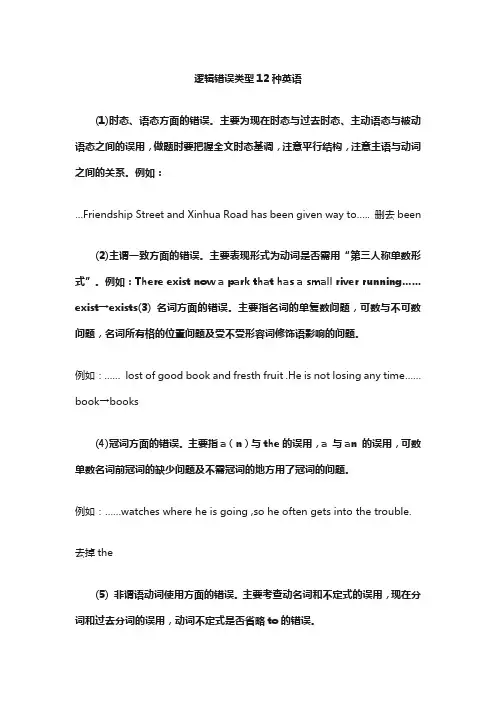
逻辑错误类型12种英语(1)时态、语态方面的错误。
主要为现在时态与过去时态、主动语态与被动语态之间的误用,做题时要把握全文时态基调,注意平行结构,注意主语与动词之间的关系。
例如:…Friendship Street and Xinhua Road has been given way to….. 删去been(2)主谓一致方面的错误。
主要表现形式为动词是否需用“第三人称单数形式”。
例如:There exist now a park that has a small river running……exist→exists(3) 名词方面的错误。
主要指名词的单复数问题,可数与不可数问题,名词所有格的位置问题及受不受形容词修饰语影响的问题。
例如:……lost of good book and fresth fruit .He is not losing any time……book→books(4)冠词方面的错误。
主要指a(n)与the的误用,a 与an 的误用,可数单数名词前冠词的缺少问题及不需冠词的地方用了冠词的问题。
例如:……watches where he is going ,so he often gets into the trouble.去掉the(5) 非谓语动词使用方面的错误。
主要考查动名词和不定式的误用,现在分词和过去分词的误用,动词不定式是否省略to的错误。
例如…from school because he is busy study what he has ……. study→studying(6)连词方面的错误。
主要表现为“and, so, or,but ”之间,“while 与when”,“however与therefore”之间的误用。
此种错误所占比例较大。
例如:Some friends of his go to see him every day , ∧they take him ……they 前加and(7)形容词、副词方面的错误。

【高中英语】易错分析:英语中12个典型的中国式错误1.这个价格对我挺合适的。
错误:价格很贵。
正:thepriceisright。
注意:最常见的用法是以否定的形式出现在通知或通知上。
例如,以下项目不适合儿童。
以下项目不适合儿童。
这句话更适合用下面的说法。
2.你是做什么的呢?你的工作是什么?正:areyouworkingatthemoment?小贴士:你的工作有什么问题吗?对因为如果你谈话的人刚刚失业,这样直接的问题会丢面子,所以你必须问:你现在在工作吗?你在工作吗?然后你问:你现在在哪里工作?你最近在哪里工作?或者你在哪个行业工作?你在做什么工作?3.用怎么说?错误:怎么说?正:howdoyousaythisinenglish?小贴士:《怎么说》是中国最流行的中式英语之一。
这绝不是一句地道的英语谚语。
同样的句子是:这个词怎么拼写?请问你怎么拼写?这个词怎么发音?这个词怎么发音?4.明天我有事情要做。
错误:我明天有事要做。
正:iamtiedupalldaytomorrow。
小贴士:用“我有事要做”来表示你很忙也是完全中国化的。
因为我们一直都有事情要做,躺在那里睡觉也很重要。
所以你可以说我很忙,无法脱身:我累了。
那一次我不能去,但我不能,我要待在家里5.我没有英文名。
错误:ihaven'tenglishname。
正:idon'thaveanenglishname。
小贴士:很多人在说英语时都会犯这样的错误。
从分析的角度来看,它可能缺乏基本技能,因为have在这里是一个实词动词,而不是现在完成时的无意义助动词。
因此,当这个句子从肯定句变成否定句时,有必要添加助动词。
理解真相是一回事,习惯真相又是另一回事。
请再说几句:我没有钱;我没有兄弟姐妹;我没有兄弟姐妹,我没有车。
我没有车6.我想我不行。
错误:我想我不能。
正:idon'tthinkican。
小贴士:当中国人说“我想我不会”时,英语总是说“我想我不会”。
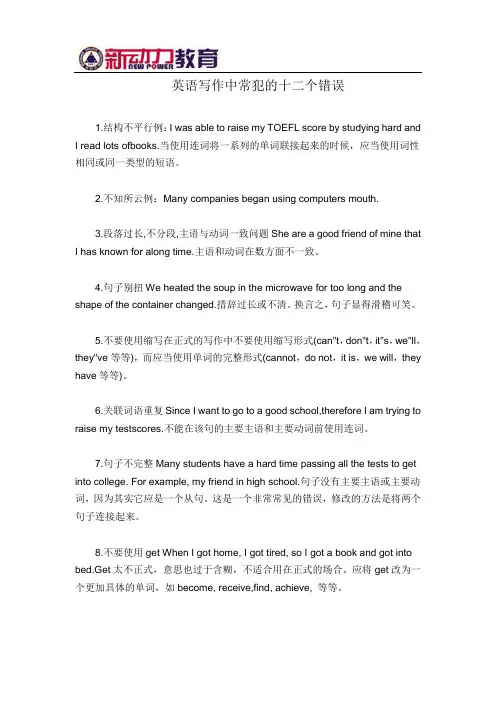
英语写作中常犯的十二个错误1.结构不平行例:I was able to raise my TOEFL score by studying hard andI read lots ofbooks.当使用连词将一系列的单词联接起来的时候,应当使用词性相同或同一类型的短语。
2.不知所云例:Many companies began using computers mouth.3.段落过长,不分段,主语与动词一致问题She are a good friend of mine thatI has known for along time.主语和动词在数方面不一致。
4.句子别扭We heated the soup in the microwave for too long and the shape of the container changed.措辞过长或不清。
换言之,句子显得滑稽可笑。
5.不要使用缩写在正式的写作中不要使用缩写形式(can"t,don"t,it"s,we"ll,they"ve等等),而应当使用单词的完整形式(cannot,do not,it is,we will,they have等等)。
6.关联词语重复Since I want to go to a good school,therefore I am trying to raise my testscores.不能在该句的主要主语和主要动词前使用连词。
7.句子不完整Many students have a hard time passing all the tests to get into college. For example, my friend in high school.句子没有主要主语或主要动词,因为其实它应是一个从句。
这是一个非常常见的错误,修改的方法是将两个句子连接起来。
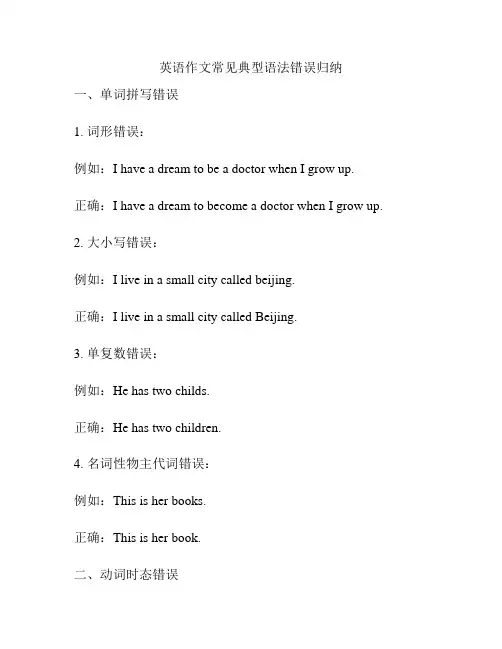
英语作文常见典型语法错误归纳一、单词拼写错误1. 词形错误:例如:I have a dream to be a doctor when I grow up.正确:I have a dream to become a doctor when I grow up.2. 大小写错误:例如:I live in a small city called beijing.正确:I live in a small city called Beijing.3. 单复数错误:例如:He has two childs.正确:He has two children.4. 名词性物主代词错误:例如:This is her books.正确:This is her book.二、动词时态错误1. 一般现在时与一般过去时错用:例如:He go to school every day. 正确:He goes to school every day.2. 不定式与动名词错用:例如:I like to swimming.正确:I like swimming.三、词类错误1. 名词与形容词错用:例如:He is a happy man.正确:He is a happy person.2. 动词与名词错用:例如:He run very fast.正确:He runs very fast.3. 副词与形容词错用:例如:He speaks soft.正确:He speaks softly.四、介词错误1. 介词与动词错用:例如:She is good in English.正确:She is good at English.2. 介词与形容词错用:例如:She is interested to English. 正确:She is interested in English.。
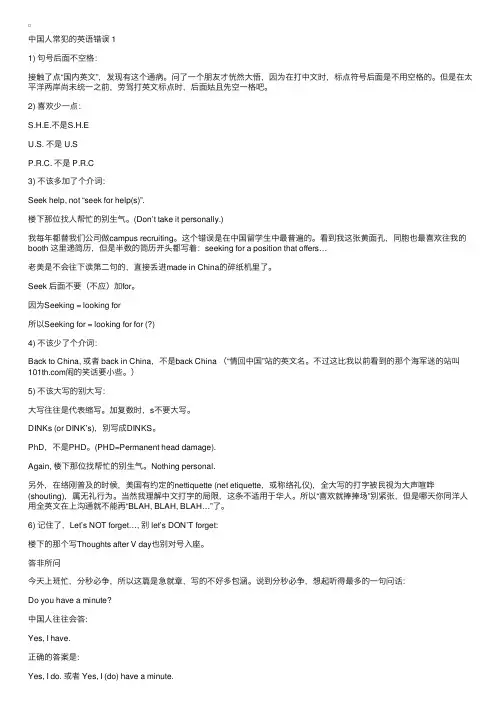
中国⼈常犯的英语错误 11) 句号后⾯不空格:接触了点“国内英⽂”,发现有这个通病。
问了⼀个朋友才恍然⼤悟,因为在打中⽂时,标点符号后⾯是不⽤空格的。
但是在太平洋两岸尚未统⼀之前,劳驾打英⽂标点时,后⾯姑且先空⼀格吧。
2) 喜欢少⼀点:S.H.E.不是S.H.EU.S. 不是 U.SP.R.C. 不是 P.R.C3) 不该多加了个介词:Seek help, not “seek for help(s)”.楼下那位找⼈帮忙的别⽣⽓。
(Don’t take it personally.)我每年都替我们公司做campus recruiting。
这个错误是在中国留学⽣中最普遍的。
看到我这张黄⾯孔,同胞也最喜欢往我的booth 这⾥递简历,但是半数的简历开头都写着:seeking for a position that offers…⽼美是不会往下读第⼆句的,直接丢进made in China的碎纸机⾥了。
Seek 后⾯不要(不应)加for。
因为Seeking = looking for所以Seeking for = looking for for (?)4) 不该少了个介词:Back to China, 或者 back in China,不是back China (“情回中国”站的英⽂名。
不过这⽐我以前看到的那个海军迷的站叫闹的笑话要⼩些。
)5) 不该⼤写的别⼤写:⼤写往往是代表缩写。
加复数时,s不要⼤写。
DINKs (or DINK’s),别写成DINKS。
PhD,不是PHD。
(PHD=Permanent head damage).Again, 楼下那位找帮忙的别⽣⽓。
Nothing personal.另外,在络刚普及的时候,美国有约定的nettiquette (net etiquette,或称络礼仪),全⼤写的打字被民视为⼤声喧哗(shouting),属⽆礼⾏为。
当然我理解中⽂打字的局限,这条不适⽤于华⼈。
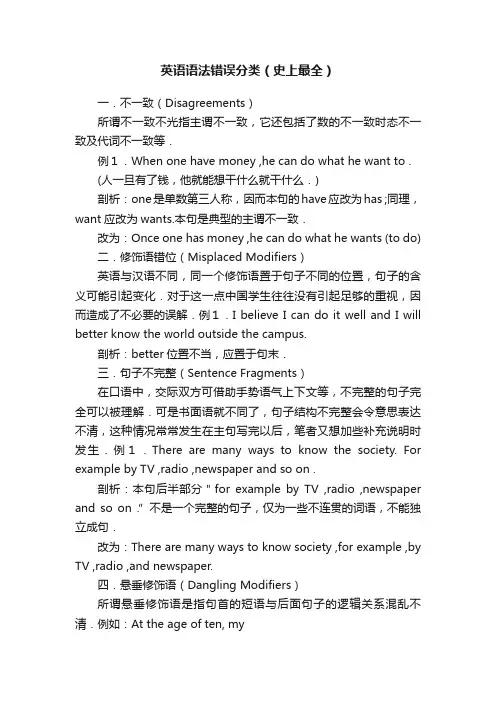
英语语法错误分类(史上最全)一.不一致(Disagreements)所谓不一致不光指主谓不一致,它还包括了数的不一致时态不一致及代词不一致等.例1.When one have money ,he can do what he want to .(人一旦有了钱,他就能想干什么就干什么.)剖析:one是单数第三人称,因而本句的have应改为has ;同理,want应改为wants.本句是典型的主谓不一致.改为:Once one has money ,he can do what he wants (to do) 二.修饰语错位(Misplaced Modifiers)英语与汉语不同,同一个修饰语置于句子不同的位置,句子的含义可能引起变化.对于这一点中国学生往往没有引起足够的重视,因而造成了不必要的误解.例1.I believe I can do it well and I will better know the world outside the campus.剖析:better位置不当,应置于句末.三.句子不完整(Sentence Fragments)在口语中,交际双方可借助手势语气上下文等,不完整的句子完全可以被理解.可是书面语就不同了,句子结构不完整会令意思表达不清,这种情况常常发生在主句写完以后,笔者又想加些补充说明时发生.例1.There are many ways to know the society. For example by TV ,radio ,newspaper and so on .剖析:本句后半部分"for example by TV ,radio ,newspaper and so on .”不是一个完整的句子,仅为一些不连贯的词语,不能独立成句.改为:There are many ways to know society ,for example ,by TV ,radio ,and newspaper.四.悬垂修饰语(Dangling Modifiers)所谓悬垂修饰语是指句首的短语与后面句子的逻辑关系混乱不清.例如:At the age of ten, mygrandfather died. 这句中"at the age of ten"只点出十岁时,但没有说明” 谁”十岁时.按一般推理不可能是my grandfather, 如果我们把这个悬垂修饰语改明确一点,全句就不那么费解了.改为:When I was ten, my grandfather died.例1.To do well in college, good grades are essential.剖析:句中不定式短语“to do well in college” 的逻辑主语不清楚.改为:To do well in college, a student needs good grades.五.词性误用(Misuse of Parts of Speech)“词性误用”常表现为:介词当动词用;形容词当副词用;名词当动词用等.例1.None can negative the importance of money.剖析:negative 系形容词,误作动词。
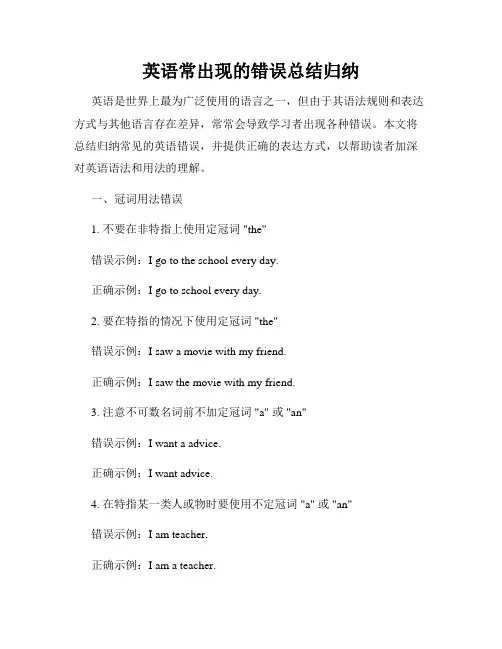
英语常出现的错误总结归纳英语是世界上最为广泛使用的语言之一,但由于其语法规则和表达方式与其他语言存在差异,常常会导致学习者出现各种错误。
本文将总结归纳常见的英语错误,并提供正确的表达方式,以帮助读者加深对英语语法和用法的理解。
一、冠词用法错误1. 不要在非特指上使用定冠词 "the"错误示例:I go to the school every day.正确示例:I go to school every day.2. 要在特指的情况下使用定冠词 "the"错误示例:I saw a movie with my friend.正确示例:I saw the movie with my friend.3. 注意不可数名词前不加定冠词 "a" 或 "an"错误示例:I want a advice.正确示例:I want advice.4. 在特指某一类人或物时要使用不定冠词 "a" 或 "an"错误示例:I am teacher.正确示例:I am a teacher.二、时态和语态错误1. 使用一般过去时表示现在的动作错误示例:Yesterday, I go to the library.正确示例:Yesterday, I went to the library. 2. 使用现在进行时表示未来的动作错误示例:I am meeting my friend tomorrow.正确示例:I will meet my friend tomorrow.3. 使用被动语态时要注意动词形式的变化错误示例:The cake made by me.正确示例:The cake was made by me.三、动词形式错误1. 不要在动词后面加 "-s" 形成复数形式错误示例:He go to school every day.正确示例:He goes to school every day.2. 使用不正确的动词时态错误示例:I have went to the supermarket.正确示例:I have gone to the supermarket.3. 不要忽略动词不定式 "to"错误示例:I want go home.正确示例:I want to go home.四、形容词和副词的用法错误1. 不要使用形容词修饰动词错误示例:He speaks English good.正确示例:He speaks English well.2. 不要使用形容词修饰名词错误示例:I have a happy news to tell you.正确示例:I have happy news to tell you.3. 注意副词在句中的位置错误示例:I always late for school.正确示例:I am always late for school.五、介词用法错误1. 注意介词的正确搭配错误示例:I am interested in for learning English.正确示例:I am interested in learning English.2. 介词后使用动词原形错误示例:I am good at to play basketball.正确示例:I am good at playing basketball.六、固定搭配和习惯用语错误1. 注意习惯用语的正确使用错误示例:I made my homework.正确示例:I did my homework.2. 注意固定搭配的正确表达方式错误示例:I go to the bed.正确示例:I go to bed.七、词汇使用错误1. 不要使用同音异义词错误替换错误示例:I read a new book yesterday.正确示例:I read a new newspaper yesterday.2. 注意动词和名词的不同用法错误示例:I have a look to the picture.正确示例:I take a look at the picture.综上所述,英语学习中常见的错误包括冠词用法错误、时态和语态错误、动词形式错误、形容词和副词的用法错误、介词用法错误、固定搭配和习惯用语错误以及词汇使用错误等。
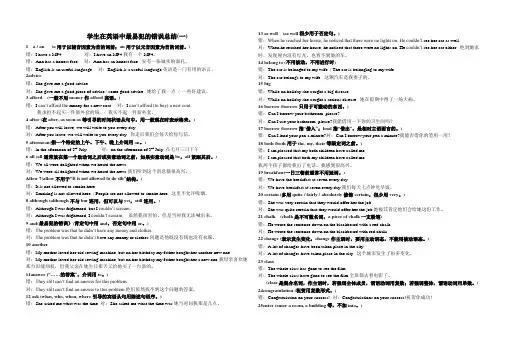
学生在英语中最易犯的错误总结(一)1 a / an (a用于以辅音因素为首的词前;an用于以元音因素为首的词前。
)错:I have a MP4. 对:I have an MP4.我有一个MP4。
错:Ann has a honest face. 对:Ann has an honest face. 安有一张诚实的面孔。
错:English is an useful language. 对:English is a useful language.英语是一门有用的语言。
2advice错:She gave me a good advice.对:She gave me a good piece of advice / some good advice. 她给了我一点/ 一些好建议。
3 afford (一般不用money作afford宾语。
)错:I can’t afford the money for a new coat. 对:I can’t afford (to buy) a new coat.我承担不起买一件新外套的钱。
/ 我买不起一件新外套。
4 after (在after, as soon as等引导的时间状语从句中,用一般现在时表示将来。
)错:After you will leave, we will write to you every day.对:After you leave, we will write to you every day. 你走后我们会每天给你写信。
5 afternoon(指一个特定的上午、下午、晚上介词用on。
)错:in the afternoon of 3rd July 对:on the afternoon of 3rd July 在七月三日下午6 all (all通常放在第一个助动词之后或实意动词之前,如果实意动词是be,all紧跟其后。
)错:We all were delighted when we heard the news.对:We were all delighted when we heard the news.我们听到这个消息都很高兴。
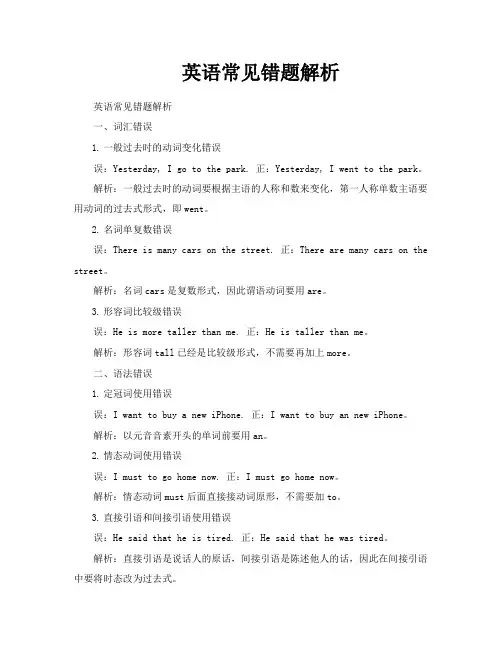
英语常见错题解析英语常见错题解析一、词汇错误1.一般过去时的动词变化错误误:Yesterday, I go to the park. 正:Yesterday, I went to the park。
解析:一般过去时的动词要根据主语的人称和数来变化,第一人称单数主语要用动词的过去式形式,即went。
2.名词单复数错误误:There is many cars on the street. 正:There are many cars on the street。
解析:名词cars是复数形式,因此谓语动词要用are。
3.形容词比较级错误误:He is more taller than me. 正:He is taller than me。
解析:形容词tall已经是比较级形式,不需要再加上more。
二、语法错误1.定冠词使用错误误:I want to buy a new iPhone. 正:I want to buy an new iPhone。
解析:以元音音素开头的单词前要用an。
2.情态动词使用错误误:I must to go home now. 正:I must go home now。
解析:情态动词must后面直接接动词原形,不需要加to。
3.直接引语和间接引语使用错误误:He said that he is tired. 正:He said that he was tired。
解析:直接引语是说话人的原话,间接引语是陈述他人的话,因此在间接引语中要将时态改为过去式。
三、句子结构错误1.主谓一致错误误:The dog barks at the cats. 正:The dog bark at the cats。
解析:主语dog是单数形式,因此谓语动词要用单数形式barks。
2.并列连词使用错误误:I like to swim and playing tennis. 正:I like to swim and play tennis。
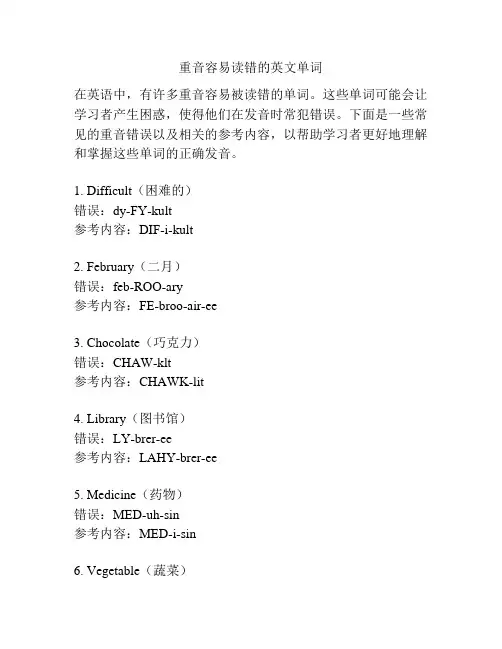
重音容易读错的英文单词在英语中,有许多重音容易被读错的单词。
这些单词可能会让学习者产生困惑,使得他们在发音时常犯错误。
下面是一些常见的重音错误以及相关的参考内容,以帮助学习者更好地理解和掌握这些单词的正确发音。
1. Difficult(困难的)错误:dy-FY-kult参考内容:DIF-i-kult2. February(二月)错误:feb-ROO-ary参考内容:FE-broo-air-ee3. Chocolate(巧克力)错误:CHAW-klt参考内容:CHAWK-lit4. Library(图书馆)错误:LY-brer-ee参考内容:LAHY-brer-ee5. Medicine(药物)错误:MED-uh-sin参考内容:MED-i-sin6. Vegetable(蔬菜)参考内容:VEJ-tuh-buhl7. Mischievous(淘气的)错误:miz-CHEE-vee-us参考内容:MIS-chuh-vuhs8. Schedule(时间表)错误:SKEJ-ool参考内容:SKEH-jool9. Comfortable(舒适的)错误:CUM-fer-tuh-buhl参考内容:KUHM-fert-uh-buhl10. Photography(摄影)错误:foh-TOG-ruh-fee参考内容:fuh-TOG-ruh-fee11. Restaurant(餐厅)错误:RES-tuh-rant参考内容:RES-tuh-rawnt12. Wednesday(星期三)错误:WENZ-day参考内容:WENZ-dey13. Tomato(番茄)参考内容:tuh-MAH-toh14. Et cetera(等等)错误:ex-SET-ruh参考内容:et SET-uh-ruh15. Refrigerator(冰箱)错误:ree-FRIDG-uh-ray-ter 参考内容:ri-FRIJ-uh-ray-ter16. Australia(澳大利亚)错误:o-STRAIL-ya参考内容:uh-STREY-lee-uh17. Elephant(大象)错误:EE-luh-fent参考内容:EL-uh-fent18. Laboratory(实验室)错误:lab-ROH-ra-tory参考内容:luh-BORE-uh-tory19. History(历史)错误:HISS-tore-ee参考内容:HISS-tree20. Female(女性)错误:FEE-male参考内容:FEE-mayl这些例子涵盖了一些常见的重音错误。
[第一类] 名词类1. 这些女老师们在干什么?[误] What are the woman teachers doing?[正] What are the women teachers doing?[析] 在英语中,当一名词作定语修饰另一名词(单或复数形式)时,作定语的名词一般要用其单数形式;但当man, woman作定语修饰可数名词复数形式时,要用其复数形式men, women.2. 房间里有多少人?[误] How many peoples are there in the room?[正] How many people are there in the room?[析] people作“人、人们”解时,是个集合名词,其单复数同形。
3. 我想为我儿子买两瓶牛奶。
[误] I want to buy two bottle of milk for my son.[正] I want to buy two bottles of milk for my son.[析] 表示不可数名词的数量时,常用“a / an或数词+表量的可数名词+ of + 不可数名词”这一结构,其中当数词大于1时,表量的可数名词要用其复数形式。
[第二类] 动词类4. 你妹妹通常什么时候去上学?[误] What time does your sister usually goes to school?[正] What time does your sister usually go to school?[析] 借助助动词do(或does)构成疑问句或否定句时,句中的谓语动词用其原形。
5. 琳达晚上经常做作业,但今晚她在看电视。
[误] Linda often do her homework in the evening, but this evening she watching TV.[正] Linda often does her homework in the evening, but this evening she is watching TV.[析] 在初一英语学习阶段,我们接触到了两种主要时态:一般现在时和现在进行时。
1. Loosefor loseNo: I always loose the product key.Yes: I always lose the product key.2. It's for its (or god forbid, its')No: Download the HTA, along with it's readme file.Yes: Download the HTA, along with its readme file.No: The laptop is overheating and its making that funny noise again.Yes: The laptop is overheating and it's making that funny noise again.3. They're for their for thereNo: The managers are in they're weekly planning meeting.Yes: The managers are in their weekly planning meeting.No: The techs have to check there cell phones at the door, and their not happy about it.Yes: The techs have to check their cell phones at the door, and they're not happy about it.4. i.e. for e.g.No: Use an anti-spyware program (i.e., AdAware).Yes: Use an anti-spyware program (e.g., AdAware).Note: The term i.e. means "that is"; e.g. means "for example." And a comma follows both of them.5. Effectfor affectNo: The outage shouldn't effect any users during work hours.Yes: The outage shouldn't affect any users during work hours.Yes: The outage shouldn't have any effect on users.Yes: We will effect several changes during the downtime.Note: Impact is not a verb. Purists, at least, beg you to use affect instead:No: The outage shouldn't impact any users during work hours.Yes: The outage shouldn't affect any users during work hours.Yes: The outage should have no impact on users during work hours.6. You're for yourNo: Remember to defrag you're machine on a regular basis.Yes: Remember to defrag your machine on a regular basis.No:Your right about the changes.Yes:You're right about the changes.7. Different than for different fromNo: This setup is different than the one at the main office.Yes: This setup is different from the one at the main office.Yes: This setup is better than the one at the main office.8. Layfor lieNo: I got dizzy and had to lay down.Yes: I got dizzy and had to lie down.Yes: Just lay those books over there.9. Then for thanNo: The accounting department had more problems then we did.Yes: The accounting department had more problems than we did.Note:Here's a sub-peeve. When a sentence construction begins with If, youdon't need a then. Then is implicit, so it's superfluous and wordy:No: If you can't get Windows to boot, then you'll need to call Ted.Yes: If you can't get Windows to boot, you'll need to call Ted.10. Could of, would of for could have, would haveNo: I could of installed that app by mistake.Yes: I could have installed that app by mistake.No: I would of sent you a meeting notice, but you were out of town.Yes: I would have sent you a meeting notice, but you were out of town.。
英语初中典型错句总结归纳在初中英语学习过程中,学生们常常会犯一些常见的语法错误,这些错误不仅影响到学生的语言表达能力,也会影响到他们的写作和交流能力。
本文将总结和归纳初中英语学习中典型的错句,以帮助学生们更好地理解和避免这些错误。
一、主谓一致错误1. 错误:She don't like ice cream.正确:She doesn't like ice cream.2. 错误:I are a student.正确:I am a student.3. 错误:The dogs is barking loudly.正确:The dogs are barking loudly.二、时态错误1. 错误:Yesterday, I go to the park.正确:Yesterday, I went to the park.2. 错误:He will goes to the cinema tomorrow.正确:He will go to the cinema tomorrow.3. 错误:She has eat lunch already.正确:She has eaten lunch already.三、冠词错误1. 错误:I want a apple.正确:I want an apple.2. 错误:Can you give me the newspaper?正确:Can you give me a newspaper?3. 错误:He is in the school today.正确:He is at school today.四、介词错误1. 错误:I am good in math.正确:I am good at math.2. 错误:He is waiting on the bus stop.正确:He is waiting at the bus stop.3. 错误:She is angry with me on my lateness.正确:She is angry with me about my lateness.五、动词用法错误1. 错误:I want to drink water.正确:I want to drink some water.2. 错误:They are all very interesting in playing volleyball.正确:They are all very interested in playing volleyball.3. 错误:I can to swim.正确:I can swim.六、连词错误1. 错误:I like playing basketball, or to play soccer.正确:I like playing basketball, but I don't like playing soccer.2. 错误:He didn't come to school yesterday because he was sick.正确:He didn't come to school yesterday because of his illness.七、代词错误1. 错误:He is going to the park, and he bring his friend with us.正确:He is going to the park, and he is bringing his friend with him.2. 错误:My sister and me are going to the party.正确:My sister and I are going to the party.八、语态错误1. 错误:The window is broken by him.正确:He broke the window.2. 错误:The cake was made by my mother yesterday.正确:My mother made the cake yesterday.以上是初中英语学习中常见的典型错句的总结归纳。
生活中易犯的英语错误很多童鞋在说英语的时候多半“凭感觉”,觉得意思到了,犯些小错误也无妨。
但正是这些小细节,让你的英语听起来非常不地道。
有时,即便语法正确了,但由于不符合英语语言习惯(Idiomatic English),也会显得很别扭。
比如,问对方是做什么工作的,你也许会说,What is your job?语法正确,但正常人不这么说话,他们会说,What do you do?所以下面这些细节,要重视起来,努力改正。
Word Choice单词选择1. 你的外套破了。
Incorrect: Your coat is broken.Correct: Your coat is torn.2. 总之苏珊没犯错。
Incorrect: Susan didn't make a fault anyway.Correct: Susan didn't make a mistake anyway.3. 能借你电话用下吗?Incorrect: May I borrow your phone?Correct: May I use your phone?4. 他有所好转。
Incorrect: He becomes better.Correct: He got better.5. 外面天还亮。
Incorrect: It was still bright outside.Correct: It was still light outside.6. 在美国一般学生都不穿校服。
Incorrect: Common students in U.S. don't wear a uniform. Correct: The average students in U.S. don't wear a uniform.7. 这道色拉是谁做的?Incorrect: Who cooked this salad?Correct: Who made this salad?8. 让我给你把把脉。
英语常见错误英语常见错误英语中有很多错误是很容易犯的,下面这些英语常见错误,快看看你有没有犯吧。
Adverb Use副词用法1. 去哪儿都行。
Incorrect: Anywhere will do.Correct: Any place will do.2. 会议定在今天下午3点召开。
Incorrect: The general meeting is scheduled to be held this afternoon at three.Correct: The general meeting is scheduled to be held at three this afternoon.3. 昨天早上在费尔大街,她偶遇了她的男朋友。
Incorrect: She ran into her boyfriend yesterday morning in Fair Avenue.Correct: She ran into her boyfriend in Fair Avenue yesterday morning.4. 不要对我抱太多期望。
Incorrect: Don't expect me too much.Correct: Don't expect too much from (of) me.5. 给我点钱吧,如果你有的话。
Incorrect: Give me money, if you have.Correct: Give me money, if you have any.6. 他待我十分友好。
Incorrect: He treated me very friendly.Correct: He treated me in a friendly way.Conjunction Use连词用法1. 和我不一样,她对英语很精通。
Incorrect: Different from me, she is proficient in English.Correct: Unlike me, she is proficient in English.2. 莫妮卡,借我点钱吧,比方说500美元。
[第一类] 名词类1. 这些女老师们在干什么?[误] What are the woman teachers doing?[正] What are the women teachers doing?[析] 在英语中,当一名词作定语修饰另一名词(单或复数形式)时,作定语的名词一般要用其单数形式;但当man, woman作定语修饰可数名词复数形式时,要用其复数形式men, women.2. 房间里有多少人?[误] How many peoples are there in the room?[正] How many people are there in the room?[析] people作“人、人们”解时,是个集合名词,其单复数同形。
3. 我想为我儿子买两瓶牛奶。
[误] I want to buy two bottle of milk for my son.[正] I want to buy two bottles of milk for my son.[析] 表示不可数名词的数量时,常用“a / an或数词+表量的可数名词+ of + 不可数名词”这一结构,其中当数词大于1时,表量的可数名词要用其复数形式。
[第二类] 动词类4. 你妹妹通常什么时候去上学?[误] What time does your sister usually goes to school?[正] What time does your sister usually go to school?[析] 借助助动词do(或does)构成疑问句或否定句时,句中的谓语动词用其原形。
5. 琳达晚上经常做作业,但今晚她在看电视。
[误] Linda often do her homework in the evening, but this evening she watching TV.[正] Linda often does her homework in the evening, but this evening she is watching TV.[析] 在初一英语学习阶段,我们接触到了两种主要时态:一般现在时和现在进行时。
——这个春节你回家吗?
——是的,我回去。
--Will you be going back home for the Spring Festival?
误:--Of course!
正:--Sure. / Certainly.
提示:以英语为母语的人使用of course的频率要比中国的学生低得多,只有在回答一些众所周知的问题时才说of course。
因为of course后面隐含的一句话是“我当然知道啦!难道我是一个傻瓜吗?”因此,of course带有挑衅的意味。
在交谈时,用sure或certainly 效果会好得多。
同时,of course not也具挑衅的意味。
正常情况下语气温和的说法是certainly not。
英语口译
我想我不行。
误:I think I can't.
正:I don't think I can.
提示:汉语里说“我想我不会”的时候,英语里面总是说“我不认为我会”。
以后您在说类似的英语句子的时候,只要留心,也会习惯英语的表达习惯的。
我没有英文名。
误:I haven't English name.
正:I don't have an English name.
提示:许多人讲英语犯这样的错误,从语法角度来分析,可能是语法功底欠缺,因为have在这里是实义动词,而并不是在现在完成时里面那个没有意义的助动词。
所以,这句话由肯定句变成否定句要加助动词。
明白道理是一回事,习惯是另一回事,请您再说几话:我没有钱;I don't have any money.我没有兄弟姐妹;I don't have any brothers or sisters.我没有车。
I don't have a car.
现在几点钟了?
误:What time is it now?
正:What time is it, please?
提示:What time is it now是一个直接从汉语翻译过的句子,讲英语的时候没有必要说now,因为您不可能问what time was it yesterday, 或者what time is it tommorow?所以符合英语习惯的说法是:请问现在几点了?还有一种说法是:How are we doing for time?这句话在有时间限制的时候特别合适。
我的舞也跳得不好。
误:I don't dance well too.
正:I am not a very good dancer either.
提示:当我们说不擅长做什么事情的时候,英语里面通常用not good at something,英语的思维甚至直接踊跃到:我不是一个好的舞者。
我的英语很糟糕。
误:My English is poor.
正:I am not 100% fluent, but at least I am improving.
提示:有人开玩笑说,全中国人最擅长的一句英文是:My English is poor. 外国人遇到自己外语不好的情况,他们会说: I am still having a few problem, but I am getting better.
你愿意参加我们的晚会吗?
误:Would you like to join our party on Friday?
正:Would you like to come to our party on Friday night?
提示:join往往是指参加俱乐部或者协会,如:join a health club; join the Communist Party.事实上,常常与party搭配的动词是come 或者go。
如go a wild party,或者come to a Christmas Party。
11. 我没有经验。
误:I have no experience.
正:I don't know much about that.
提示:I have no experience这句话听起来古里古怪,因为您只需要说那方面我懂得不多,或者这方面我不在行,就行了。
I am not really an expert in this area..
用英语怎么说?
误:How to say?
正:How do you say this in English?
提示:How to say是在中国最为泛滥成灾的中国式英语之一,这绝不是地道的英语说法。
同样的句子有:请问这个词如何拼写?How do you spell that please?请问这个单词怎么读?How do you pronounce this word?
明天我有事情要做。
中考英语
误:I have something to do tomorrow.
正:I am tied up all day tomorrow.
提示:用I have something to do来表示您很忙,这也完全是中国式的说法。
因为每时每刻我们都有事情要做,躺在那里睡大觉也是事情。
所以您可以说我很忙,脱不开身:I'm tied up.还有其他的说法:I can't make it at that time. I'd love to, but I can't, I have to stay at home.。